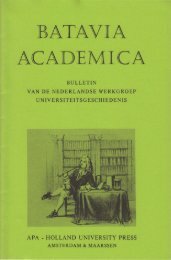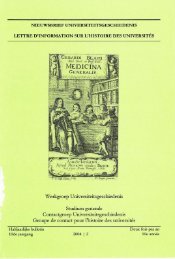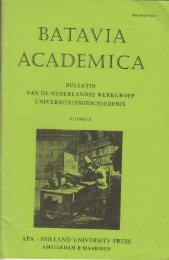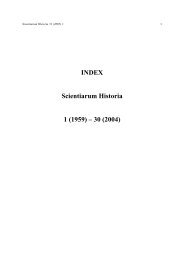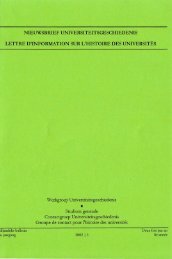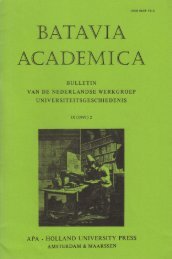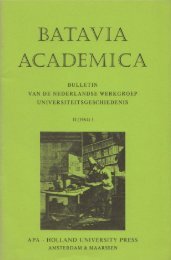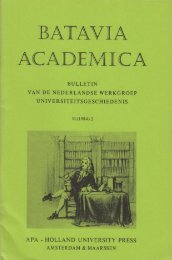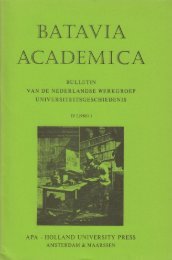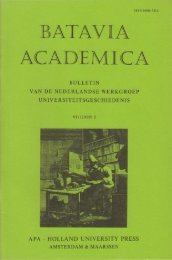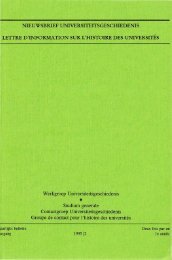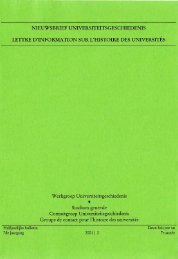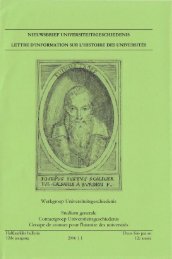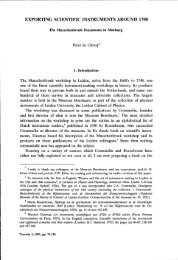the ocular harpsichord of louis-bertrand castel - Gewina
the ocular harpsichord of louis-bertrand castel - Gewina
the ocular harpsichord of louis-bertrand castel - Gewina
You also want an ePaper? Increase the reach of your titles
YUMPU automatically turns print PDFs into web optimized ePapers that Google loves.
Castel's <strong>ocular</strong> <strong>harpsichord</strong> 69<br />
moreover, physically or psychologically "true" colour scale. On <strong>the</strong> o<strong>the</strong>r hand,<br />
Castel seemed to believe that <strong>the</strong> existing colour arts, not only painting but also<br />
dance and pantomime, were somehow parts <strong>of</strong> this as yet nonexistent colour<br />
music, or somehow subordinate to its rules. The suggested comparison <strong>of</strong> music<br />
with painting as <strong>the</strong>se art forms existed in general was too vague, and already<br />
too <strong>of</strong>ten voiced in <strong>the</strong> past, to be able to convince painters that <strong>the</strong>re was<br />
anything to be gained from studying it.<br />
On <strong>the</strong> whole one has to admit that Castel himself took no part in <strong>the</strong><br />
adventures <strong>of</strong> his <strong>harpsichord</strong>. Both in his science and in his aes<strong>the</strong>tics Castel<br />
was looking backward ra<strong>the</strong>r than forward, although many passages in his<br />
writings seem to point to future developments. The groping way in which<br />
Wilhelm Heinse towards <strong>the</strong> end <strong>of</strong> <strong>the</strong> century tried to frame his experiences <strong>of</strong><br />
<strong>the</strong> beauty <strong>of</strong> nature into <strong>the</strong> language <strong>of</strong> colour harmony are remarkably similar<br />
to <strong>the</strong> way Castel spoke about his colour music on some occasions: "I saw a<br />
garden dotted with flowers: a sweet zephyr blew, and singling out that moment, I<br />
saw <strong>the</strong> <strong>harpsichord</strong>. I saw a meadow strewn with rose drops; <strong>the</strong> sun rose, I<br />
moved my head a little, and my eye said to me: <strong>the</strong>re is <strong>the</strong> <strong>harpsichord</strong>."'""<br />
Epilogue<br />
With E.TA. H<strong>of</strong>fmann, in 1819, <strong>the</strong> debate on <strong>the</strong> <strong>ocular</strong> <strong>harpsichord</strong> and on<br />
colour music in Germany finally died. The same year also saw its final flickering<br />
in England. In 1814 David Brewster had invented <strong>the</strong> kaleidoscope, an instrument<br />
<strong>of</strong> which in London and Paris toge<strong>the</strong>r 200.000 copies were sold within<br />
three months. In 1819 Brewster wrote A treatise on <strong>the</strong> kaleidoscope, explaining<br />
its working, as so many bad ones were circulating. In his book he praised Castel<br />
as "<strong>the</strong> first person who attempted to supply <strong>the</strong> organ <strong>of</strong> vision with <strong>the</strong> luxuries<br />
<strong>of</strong> light and colour", criticizing him, however, for not having realized that colours<br />
can not please for long if <strong>the</strong>y arc not combined with beautiful forms. After sixty<br />
years Brewster saw himself as having achieved what Castel had so vainly toiled<br />
at:<br />
Those who have been in <strong>the</strong> habit <strong>of</strong> using a correct Kaleidoscope, furnished with proper<br />
objects, will have no hesitation in admitting, that this instrument realizes, in <strong>the</strong> fullest manner,<br />
<strong>the</strong> formerly chimerical idea <strong>of</strong> an <strong>ocular</strong> <strong>harpsichord</strong>, llie combination <strong>of</strong> fine forms, and evervarying<br />
tints, which it presents, in succession, to <strong>the</strong> eye, have already been found, by ex-<br />
Memoires de Tre\oux, December 1735, p. 2699: "J'avois vii un Parterre jonche de fleurs:<br />
un doux Zcphire avoit soufle, & saisissant cet instant, j'avois vii le Clavecin. J'avois vu une Prairie<br />
semee de rosee; le Soleil s'etoit levc, j'avois fait un mouvement de tele. & mon oeil m'avoit dit,<br />
voila le Clavecin."



